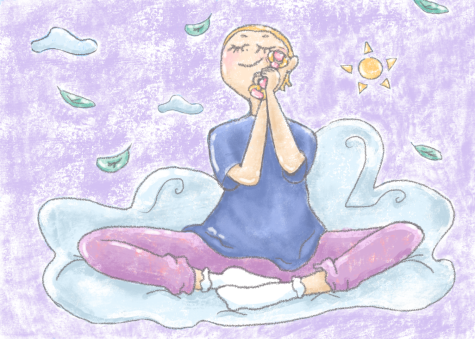‘The world’s issue with you is not your issue’: Meditation and grounding tips for the neurodivergent community
April 5, 2022

Hayden Mears always felt he was “different,” but could never quite put his finger on why.
The junior journalism major recalled it in the ways that he was treated by others and how he perceived things.
“This world is not built for neurodivergent people yet. I think we’re slowly getting around to the realization that there’s a lot of different types of neurodiversity, and that ‘neurotypical’ doesn’t really exist,” Mears said. “Everybody’s brains are different, and … we all have our quirks — so the term neurotypical is a little bit reductive because diversity is just from brain to brain. It’s everybody.”
Having both autism and attention-deficiency issues growing up, Mears sensed how he saw and felt the world was different than his peers around him.
“The world is a very overwhelming place for me,” he said. “Sounds are more intense to me. I notice smells a lot more intensely. I feel the world a lot more intensely, and so especially living in downtown Chicago, that can be very overwhelming and I can shut down pretty easily. Self-care has been everything because it allows me to get through my day.”
JulieAnn Graham, an adjunct faculty member in the Theatre department, stressed the importance of having a sense of safety in an environment, especially when it requires individuals to move around and put themselves in the spotlight. Graham’s Columbia biography describes her as “a certified Yoga instructor and incorporates yoga, meditation, and improvisation into her classes to help build mindful, aware, and fully creative artists.”
As a result of being in touch with our bodies, “muscles get stronger and stronger, we’re able to be a little bit more neutral in some ways, openly curious or have different coping capacities over time,” Graham said. “I’m working with performance, so we’re always looking at how can we stay in a place of readiness but calmness so that the anxieties don’t come in and stop the artists from being fully who they are in their performance lives.”
Noticing how feeling grounded goes hand-in-hand with performing, Graham has proposed a course in mindfulness for artists to the Theatre Department that is currently being reviewed.
Marita McLaughlin, senior meditation instructor at the Shambhala Center in Chicago and an integrative psychotherapist, said whenever people feel overwhelmed, they should see if they can “relate to their feet on the ground.” She also suggested an alternative, trying to be open to one’s five sense perceptions.
“Feeling our feet on the ground is one through touch, but also adding into that, perhaps noticing whatever we’re hearing through sound, whatever we see through sight, smell or taste,” McLaughlin said. “When we connect with [our sense perceptions] in the present moment, they cut through the thought process — there’s no thought associated with when we notice those senses.”
McLaughlin emphasized the importance of self-acceptance not only in meditation and grounding, but in everything. By “othering” ourselves and each other, or categorizing individuals in a box that is labeled “different,” the gap between the person and their surroundings is further divided. McLaughlin said there is a way to acknowledge one’s differences without feeling the need to see them as less-than or incapable.
“The judgment comes in from ‘other,'” McLaughlin said. “However we view ourselves in a way that’s saying, ‘I’m bad,’ ‘I’m not good enough’ or ‘I’m not doing the right thing’ is a way in which we other ourselves based on how we’ve been ‘othered’ by others — but we also have our own way of othering ourselves.”
Mears is no stranger to having been “othered” himself. He said when neurodivergent people help others understand how they see the world, it’s is a positive step forward, urging those who are not in the community to accept their peers’ social and emotional capacities.
“I know it’s hard to realize this in the moment, but the world’s issue with you is not your issue,” Mears said.
Speaking directly to those not in the community, Mears asked people to accept neurodivergent people for who they are, even if they do not understand why they do what they do.
“I’d like you to accept it if you love me,” Mears said. “Understanding is not a prerequisite for acceptance — you can accept something without having a clue as to why … and that is so unbelievably validating.”







